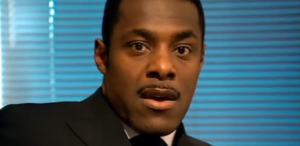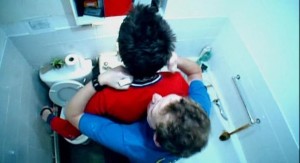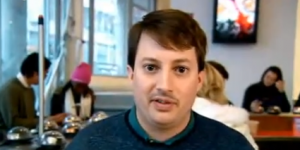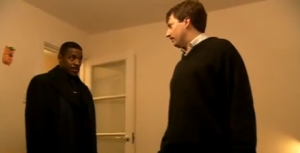“Are You Sleeping?,” Harry Nilsson
The Point!, 1971
As you folks know I’m pretty discerning when it comes to guest posts, but the slowness of new content and my undying love of Willy Wonka and the Chocolate Factory came together to convince me that this was one worth posting. Please welcome David Gerrard on behalf of TheatrePeople.com, with his look at differing interpretations of a timeless character, as we look forward to the premiere of the stage version in May. Speaking of which, if anyone does go to see it, let me know…I’d love to host a review.
For the past 50 years, Roald Dahl’s 1964 novel Charlie and The Chocolate Factory has been a regular and beloved fixture on both our bookshelves and cinema screens. With two film adaptations under its belt, every recent generation has experienced the eccentric joys of Willy Wonka’s chocolate factory and the highs and lows of Charlie’s peculiar moral journey.
Wonka himself has been depicted by the likes of Gene Wilder and Johnny Depp with varying levels of intensity and the character has, at times, greatly deviated from Dahl’s original portrayal. As we prepare for the release of a forthcoming musical, it will be interesting to see how the next incarnation of the idiosyncratic chocolatier unfolds and how the production as a whole is viewed in light of the source material.
Released in 1971 and directed by prolific documentary filmmaker Mel Stuart, the original film screenplay was actually penned by Roald Dahl himself but tweaks from The Omen writer David Seltzer left Dahl with a bitter taste in his mouth. Unimpressed by the finished product Dahl felt that it focused too much on Willy Wonka and gave Charlie a backseat, a fact reflected in the modified title which replaced Charlie’s name with Wonka’s.
Furthermore Dahl was not happy with the studio’s choice of Gene Wilder as Wonka, instead stating that he would have preferred comedian Spike Milligan.
Despite Dahl’s reaction, Wilder’s performance is often hailed as brilliant, and his droll eccentricity coupled with a suspicious edge is perfectly pitched. Possibly the definitive Wonka for many of us, he is most famous for the entrance where he hobbles in with the assistance of a cane which he drops and then feigns falling forward before launching himself into a forward roll. Wilder decided on the inclusion of this particular sequence so that he could instil a feeling of uncertainty in the audience. No-one would know whether he was lying or telling the truth, emphasising the slightly off-kilter nature of Wonka’s character.
The critical reception of the film was quite positive — although this praise was not reflected in the box office figures, where it took a mere $4m. During the 1980s however it picked up momentum on television as a Christmas holiday staple and has enjoyed considerable success in home video and DVD sales ever since. The current IMDB rating of the film stands at a respectable 7.8 out of 10, while the critics rate it 89% fresh at Rotten Tomatoes.
After Stuart’s effort, Dahl repeatedly blocked further attempts to make another film. Following his death in 1990 however, Felicity Dahl became the protector of his literary legacy and in 1996 she began plans for a new adaptation. Various directors, screenwriters and actors were linked with the project including Adam Sandler and Jim Carrey but it ultimately emerged that Tim Burton would direct the project and Johnny Depp would be on board as Willy Wonka. Given their joint cinematic history and distinctive style, they seemed like an ideal choice.
Endowed with a $150m budget, 50 times larger than the 1971 version, $17.5m was handed to Depp for the lead role which left Burton with over $130m to create his vision of the chocolate factory. His intention was to make a darker film than the 1971 version, more in line with the original novel. He also took on board Dahl’s complaints about Willy Wonka being the centre of the story in Stuart’s version, making sure that Charlie didn’t blend into the background. He recruited John August, the screenwriter behind Big Fish, imploring him to “go to the roots of the book” and add “a little bit of psychological foundation, so that Willy Wonka’s not just ‘this guy,’” as he later recounted in Burton on Burton.
Received with more consumer enthusiasm than the first adaptation, it took an impressive $475m at the box office placing it just out of the top 100 highest grossing films of all-time. Although the critical response was largely positive some reviewers criticised Depp’s performance, with Matt Doedon in his book Johnny Depp: Hollywood Rebel dubbing it not “kooky, funny, eccentric or even mildly interesting.” Noel Brown in The Hollywood Family Film described it as “uncomfortable, almost distastefully weird.”
Many cited an uncanny resemblance to Michael Jackson in both appearance and manner, cementing the portrayal as less eccentric and enigmatic than Wilder’s characterisation and situating it in an altogether creepier and more suspicious camp. It could however be argued that this is much more in line with the source material which, despite being hailed as children’s classic, is sometimes derided as insensitive and inappropriate. The Oompa Loompas in the novel were, for example, originally black pygmies, a detail modified in later editions.
The latest instalment in the saga is Charlie and the Chocolate Factory: The Musical due to open for previews at the London Palladium in May next year. Directed by Academy Award winner Sam Mendes of American Beauty and recent Skyfall fame, and featuring songs from Marc Shaiman and Scott Wittman, the duo behind Hairspray The Musical, Smash and Catch Me If You Can, it’s got a lot of talent behind it.
Following in the footsteps of Depp and Wilder is Tony and Olivier award-winning actor Douglas Hodges. The focus on Hodges as Willy Wonka and the lack of announcements regarding the remainder of the cast, particularly Charlie, is an indication that the musical will have a focal point similar to the first film. Of the forthcoming role Hodges told The Daily Telegraph that his take on Wonka would take the form of “a cross between Charlie Chaplin and Dali,” which conjures images of flawed genius colliding with a streak of the wildly surreal.
Additionally, unlike Depp in the run up to his own performance, Hodges does not seem to consider the influence of previous adaptations, instead seeing the part as fresh and untouched within his own genre. “Part of the thrill for me is that it’s brand new,” he explains. “No one’s ever heard the songs before. Shows like Guys and Dolls are brilliant, but you’re doing stuff that’s already been done. So to have something that’s a clean slate is great.” Stage is obviously an entirely different medium to film and Hodges will surely add his own genius to the role, but how his own interpretation of Wonka fares in comparison to those of Depp and Wilder remains to be seen.
Not the first Dahl novel to make it to the stage, Matilda the Musical has been hugely successful, The Witches was adapted for the stage and Fantastic Mr. Fox was also adapted as an opera. Dahl’s weird and wonderful tales have consistently made for engaging on-stage experiences.
Of course, we can only guess what Dahl would have thought of the musical but considering his sweeping hatred of the first adaptation and the indication that it may take a similar focus, it’s fair to assume he would have not taken to it with a particularly warm demeanour.
He did have a tendency to be quite hostile to most adaptations, once calling Nicolas Roeg’s The Witches “utterly appalling”. Despite this, with stage heavyweights like Mendes, Shaiman, Wittman and Hodges behind it, there’s little doubt that it will be both a visual spectacle and musical triumph. How they decide to construct Willy Wonka’s infamous chocolate river will be worth the ticket price alone.
Another article from Ben Gallivan, and let’s hope we get a lot more. In hono(u)r of the eighth series of Peep Show which begins tonight, here’s Ben to accomplish something I never could: write about an applicable subject in a timely way. Take it away, Ben!
It all starts quite simply; customer tentatively awaits the decision on a loan under the withering eye of the bank manager. The desperate inner thoughts of said customer for all to hear, despite the role-play scenario in front of a dozen or so colleagues.
So, Mr Corrigan… We’ve examined your loan application and I just have one question for you. Are you a pathetic, worthless punk?
In a normal situation, this would make Mark Corrigan’s heart jump into his mouth but, of course, it’s all fakery. Instead, the endless barrage of insults directed at him leads him into some kind of homoerotic fantasy. The fact that he is called a “turkey fucker” almost sends him into an orgasmic state. This, ladies and gentlemen is the power of “The Johnson.”
 Carefully introduced midway through the first series of Peep Show, Alan Johnson is every employee’s worst nightmare; with the possible exception of Mark Corrigan, the Radio 4 listening, weak-tea imbibing sub who graces each episode and manages to have as much of a love/hate relationship with the viewer as his partner in crime, Jeremy Osborne. Less than a minute into Johnson’s first appearance on screen, Corrigan has already declared his love for him and due to his snail-like attempt to climb the greasy pole of personal finance at JLB, the love only grows deeper.
Carefully introduced midway through the first series of Peep Show, Alan Johnson is every employee’s worst nightmare; with the possible exception of Mark Corrigan, the Radio 4 listening, weak-tea imbibing sub who graces each episode and manages to have as much of a love/hate relationship with the viewer as his partner in crime, Jeremy Osborne. Less than a minute into Johnson’s first appearance on screen, Corrigan has already declared his love for him and due to his snail-like attempt to climb the greasy pole of personal finance at JLB, the love only grows deeper.
“Mark Makes A Friend” is the fourth episode of the first series of Peep Show — screened back in 2003 and despite notching up almost ten years and 44 episodes since it still remains a milestone, due to Alan Johnson’s introduction. Despite only being a minor character (played by the excellent Patterson Joseph), any episode that has featured him since generally stands out above many others; no mean feat given the quality of the writing throughout.
The genius of Peep Show can mostly be attributed to the minor characters. Where would the show be now if it wasn’t for Jeremy’s part-time wife and nympho Nancy, or, of course, Super Hans, who is just one dimension away from a spin-off series of his own. Over the subsequent 7 series (an eighth begins tonight), Johnson / The Johnson / Alan weaves his way through many of the most important and funniest storylines that writers Jesse Artmstrong and Sam Bain have penned.
 This episode however, is one of the finest –not simply for Johnson’s introduction, but also for the sub-plot involving “the bad thing.”
This episode however, is one of the finest –not simply for Johnson’s introduction, but also for the sub-plot involving “the bad thing.”
Mark’s relationship with Johnson moves pretty quickly. After being trumped for a lift home from the training day by his arch-nemesis Jeff, he finds himself relishing the opportunity of spending some alone time with his new hero in the obligatory BMW. The “worst thing to happen to anyone ever” suddenly turns into the best. So much so that returning home to realise that he is now friends with the “big, black businessman” sends him once again into revelry of fantasy. There is no doubt good reason in emphasising the fact that Johnson is black –- the first black character in the show and pretty much the only black recurring character right through to the end of season seven.
Mark’s revelation to Jeremy that he has a new friend brings out the worst in the latter.
Friend? But you haven’t got a friend. Who’s your friend?
The mini-dinner party held that evening is where Mark’s obsession (and obvious embarrassment by Jez also being present) comes to the fore. Johnson makes no bones about his disdain for Jeremy — staring down at him like he is the “hippy parasite” mentioned earlier in the show — especially when presented with the fact that he “turns over when the news comes on.” Acting like an excited schoolboy with a crush, Mark shows Johnson –- or at least attempts to -– his progress with his book Business Secrets of the Pharaohs, but of course this is quashed with the “bad thing” sub-plot, rendering Mark’s laptop redundant after the previous night’s “mega-tsunami” whilst using it in the bath.
 Johnson knows how to play Mark; that becomes evident as the episode progresses. A joint love of middle-of-the-road and thankfully long-forgotten dirge of The Lighthouse Family whilst letting him change gear in the “Beemer” is one such example, as is the ludicrous moustache that he attempts to grow as an homage to his new “Dad” (thankfully and quickly changed to “Daddio” when questioned). So much so, that in no time at all, Johnson has him wrapped around his little finger to such an extent that he convinces Mark to up sticks and relocate to Cardiff, leaving Jeremy to fend for himself.
Johnson knows how to play Mark; that becomes evident as the episode progresses. A joint love of middle-of-the-road and thankfully long-forgotten dirge of The Lighthouse Family whilst letting him change gear in the “Beemer” is one such example, as is the ludicrous moustache that he attempts to grow as an homage to his new “Dad” (thankfully and quickly changed to “Daddio” when questioned). So much so, that in no time at all, Johnson has him wrapped around his little finger to such an extent that he convinces Mark to up sticks and relocate to Cardiff, leaving Jeremy to fend for himself.
If you love Johnson that much, why don’t you marry him? Why don’t you actually screw him?
And that is where Jeremy –- as Jeremy often does -– blurts out what everyone watching is thinking and then puts Mark on the spot…right in the middle of a sushi bar, naturally. Despite his protestations out loud, Mark’s inner thoughts are exactly that. The joy of Peep Show is that you often find that there are generally two very differing points of view and that they usually come from the same person.
Johnson is an obnoxious man. There’s no denying it. Mark’s apparent love for him only partially makes up for the hatred that most of his fellow workers hold for him. The fact that one of them went home from a seminar in tears brings Sophie to protest that “It’s not a wig, Alan, that’s actually her hair,” casually dismissed by Johnson with a “Yeah, whatever.” (Possibly the first time that phrase was used in the UK and now look what’s happened.) The bar scene ends with Mark quickly ditching the thought of being with the (former) love of his life Sophie after Johnson offers the choice of sticking with “[Sophie’s] fat arse,” or teaming up with him and some “fuck-off spreadsheets,” culminating in an inner-orgasm for Mr. Corrigan.
Mark’s struggle to find out whether or not he is actually, fully completely “gay for Johnson” continues. He is ably assisted by his own Boy Wonder (Jeremy) throughout and it is via that avenue and Jez’s crippling selfishness not to want Mark to relocate that we find the truth.
 After crashing Johnson’s prized BMW, the stand-off ensues in a bizarre three-way (so to speak) that begins with Mark declaring his new-found homosexual crush for his boss and ends in a quite unbelievable manner.
After crashing Johnson’s prized BMW, the stand-off ensues in a bizarre three-way (so to speak) that begins with Mark declaring his new-found homosexual crush for his boss and ends in a quite unbelievable manner.
Johnson, naturally, rebukes Mark’s advances and departs the episode just as he entered –- the no-holds-barred businessman with no time for women, or, in this case, men. He is seemingly disgusted by the thought of it, which, if true, makes him even less likeable as a character.
Instead, whilst re-watching some of the gay porn that Mark rented from his local shop we find that it is in fact Jeremy who has crossed to the other side; the “bad thing” from the night before being grimly realised as he and Super Hans performing fellatio on each other whilst completely high on whatever they could lay their hands on.
Johnson continues this role throughout the remaining series, forming a love/hate relationship with almost everyone that he meets and even more so with the audience. The one thing that remains constant however, is that the show would be so much weaker without him.
So! I’ve been quiet, eh? I’ve had a few things going on personally but with those squared away the updates should be a little more regular. That’s good. But I feel guilty about how little’s been going on here recently so, some updates:
– I’ve got an interview with Bernd Geiblinger of Bplus games coming up. His new release, Bit Boy!! Arcade (pictured above) was slated for a holiday 2012 release but has slipped into 2013, hence the delay. Bernd is a bit of a polarizing figure in games but he’s always been man enough to face his critics head on, which is a hugely respectable thing. I’m looking forward to the new game and the interview, and I hope you are too.
– I should have two new posts going up this week…neither of which were written by me because I’m shit. Still, I hope you’ll enjoy them…one of which is by friend of the website Ben Gallivan and the other is from a new guest author. Say what you will about guest posts…they at least keep the site alive when I forget to.
– I’ll be launching a new feature, probably in the first week of December, wherein Jacob and I butt heads over particular games or films or what-have-you, conclusively demonstrating time and time again that I am always right.
– Steve Zissou Saturdays will continue on Dec 1 (the first Saturday of the month, as always) and it’s an extremely long piece, which explains where most of my inspiration has been deposited. Look forward to ignoring that!
– I chose a new mascot, who was quickly christened Mr. Fabiola by commenter Jeff. You can read all about him on the about page, because whenever you click over to an about page it’s pretty obvious you’ll get some fictional history of some shitty blog’s fake robot.
– Christmas features. Not sure exactly what. But something.
– I also saw Wreck It Ralph, which I’ll review if there’s any interest, and which I may also review anyway if there’s no interest whatsoever.
Look at me, closing out 2012 all strong-like. Ka-kow.